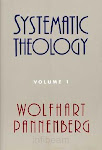This is an essay on the nature of doctrine. References are to Jaroslav Pelikan’s monographs on the development of Christian doctrine. Reference (3:241) would refer to volume 3, page 241.
1. Doctrine is “important”
2. Doctrine and mystery
3. The inadequacy of doctrine
4. The inevitability of doctrine
5. The scope of doctrine
6. “Hierarchies” of doctrine
7. The relation of words and reality
8. Liturgy as the fulfillment of doctrine
9. Love as the fulfillment of doctrine
-- -- --
“Hierarchies” of Doctrine
In addition for some kind of authority and criteria to settle the proper limits of doctrine, another thing seems to be certain as well. There seems to be some kind of “hierarchy of doctrines”, both as regards their complexity and their salvific value. These two may, or may not, coincide.
As far as complexity goes, the mysteries of the Trinity and of the Incarnation loom high up in the scale. One could say that their indirect, if not direct, role within the mystery of salvation is also extremely prominent. Perhaps only the doctrines of Redemption and with it the Atonement should be stressed more, although these cannot be comprehended without their proper relation to the Trinity and the Incarnation. And we should not forget the doctrines of the Resurrection or Ascension either…
Are, then, all so-called “levels of importance” fallacies?
Perhaps as far as the central Christian doctrines are concerned, one cannot set them in any hierarchy of importance. For they are all interdependent, organically springing from the same meta-mystery which is God himself and the drama of Creation.
But many have believed – and still do – a “domino theory” (5:57), according to which even the slightest alteration in orthodox doctrine has devastating effects, either immediately or eventually.
Without, for instance, a correct interpretation of the Eucharist, thought Durandus of Troarn, the integrity of the Christian faith was compromised and “the entire discipline of the Christian confession will perish” (3:185). Augustine taught that “who wants to be saved, must think this way about the Trinity” (2:191); for Bernard of Clairvaux the doctrine of the Trinity was not a speculative construct, or an exercise in dialectical subtlety, but “a soteriological necessity” (2:146); the Niceno-Constantinopolitan Creed stated, “This is the catholic faith; unless one believes it faithfully, one cannot be saved” (5:32).
In short, some doctrines are “a precondition for obtaining the salvation that is promised by religion”, as Harnack put it (5:268).
There are “fundamental truths” and “secondary truths”, and fundamental truth can not be ignored except “at cost of salvation” (5:57). But nearly everyone, albeit with varying criteria, affirms some form of distinction between “articles of faith” that pertained to salvation and “articles of doctrine” that do not (5:28).
The “lesser” articles of doctrine are not to be believed for salvation, but “for the integrity, connection, and neatness of someone’s theological system” (5:28). It is not wrong to defend “the truth and purity of doctrine, though within appropriate limits” (5:29).
“Faith” in these doctrines – whether salvific or non-salvific – has been defined in various ways. Faith refers either to the act of believing, to the content of what is believed, the basis of justification, to trust, to virtue, or to any combination of the aforementioned. Whatever the case, some form of distinction between “real” faith and “notional” or “conceptional” faith has always been held.
In fact, Newman uses precisely there terms. This is how he summarized his definition: “a dogma is a proposition; it stands for a notion or for a thing; and to believe it is to give the assent of the mind to it, as it stands for the one or for the other” (5:267). Therefore “to give a real assent to it is an act of religion; to give a notional [assent] is a theological act,” by which the “real assent” of religious faith takes intellectual form (5:267).
2 years ago







4 comments:
pictures,pictures,we want pictures!
Love from stupidios,
Mami
You're going to have to wait for another week, Mami. I wrote in the introduction: "Come back in about two weeks for more exciting posts."
http://21st-century-pilgrim.blogspot.com/2009/03/inadequacy-and-inevitability-of.html
But you'll probably be here by then, so you can see for yourself. :-)
Cool series! But it's the Athanasian Creed not the N-C that says one needs to hold the catholic (trinitarian) faith to be saved.
Mm.. indeed I wonder where the line goes between doctrines necessary for salvation ... if I went to the Bishop and said I disagree that there are 4 cardinal virtues what would he say... well luckily we don't have a bishop at the moment:) but there's fr. Rudolph... but his answer'd be too high up in the clouds... and then Manu.. who would childlikely dismiss the issue... hmm ok I'll just go to turku now... hey there's fr. Peter I'll ask him!
I hate to say it but you're right about it being the Athanasian Creed.
Let me know what Fr. Peter says.
Oh, and if you think further about the "content" vs. "mere words" question, do let me know. It really bothers me. (The problem intensifies when we speak of the "high" mysteries like the Trinity and the Incarnation. But in other questions it is easier to distinguish between "content" and "mere words".)
Post a Comment